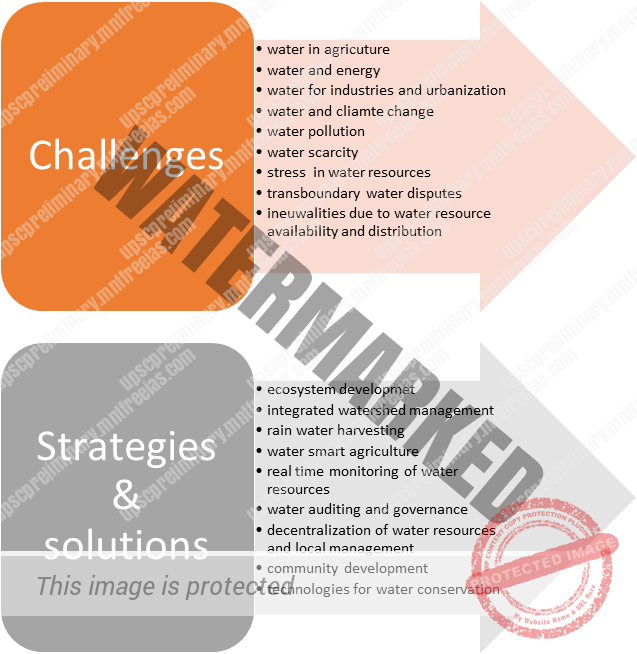- WATER MANAGEMENT – CHALLENGES AND STRATEGIES
- WATER RESOURCE MANAGEMENT
UNIT 3 – RESOURCES AND ITS UTILIZATION – PART 4
WATER MANAGEMENT – CHALLENGES AND STRATEGIES
WATER RESOURCE MANAGEMENT
It is an activity of Planning, Developing, Distributing And Managing the optimum use of water. Ideally, planning of water resource management consider all the competing demands for water and seeks to allocate water on an equitable basis to assure all uses and demands.
Water conservation involves the strategies and activities that are used to manage water resources, especially fresh water as a sustainable resource. Conservation aims at protecting the water environment and its resources from negative impacts in order to make them to be able to meet current and future demands, making them sustainable Water is widely present finite resource. Its property of universal solvent makes it highly vulnerable to pollution.
Beside its abundance, high degrees of mismatch spatially and temporally are there between availability and demand at many places. It is a challenge to provide water of desired quantity and quality at a required place. This is especially true for monsoon climates where 70–90% of the annual rain falls in just 3–4 months. This leads to too much water and often floods in the wet season, and too little water and often droughts in the dry season. At times, enough water may be available but the quality may be so poor that it is of no use without treatment. Water conservation is one of the main problems societies are facing today.
Climate change and increase in population growth has also exacerbated the crisis.
The most affected are the communities at the lower class and Indian villages. Women and children also suffer most as they have to walk long distances to get water for domestic use. The use of water has been growing at more than twice the rate of population growth.
Dry lands are the most affected since they do not have the right infrastructure to deal with this issue. Water scarcity and other challenges go hand in hand with poverty most of the times and eradicating this issue will lead to the improvement of poverty levels in the society (UN, 2012).
Sustainable Water Management Poses Numerous Challenges:
- Bridging The Increasing Gap Between Demand And Supply
- Providing Enough Water For Production Of Food
- Balancing The Uses Between Competing Demand
- Meeting The Growing Demands Of Big Cities
- Treatment Of Wastewater
- Sharing Of Water with the neighbouring countries and among the co-basin states
In India, Floods, Water-Logging, Soil Erosion, Drought Salty Groundwater, etc. are some of the major problems of water management for agriculture and other needs.

